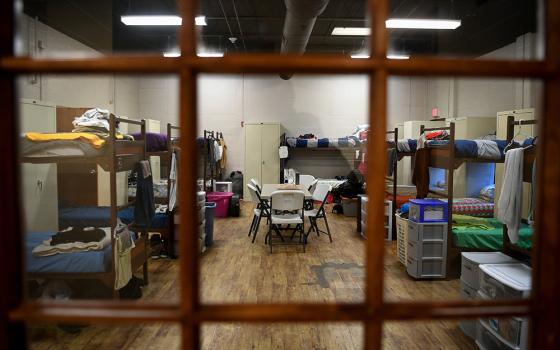Today, the praying assembly hears the vocational experiences of Isaiah, Paul and three of Jesus’ first disciples, Simon, James and John. In three very different encounters, these believers heard and heeded God’s call, and in that moment, their lives changed course and took a direction they had not planned.

| Fifth Sunday in Ordinary Time |
|
Isaiah 6:1-2, 3-8 Psalm 138 1 Corinthians 15:1-11 Luke 5:1-11 |
Isaiah was a priest and counselor to four of Israel’s kings; he was called to be God’s prophet and discerner of God’s will for a people often unwilling to hear and reluctant to change their lives. Paul, who moved easily in three different worlds -- Pharisaic Judaism, in which he enjoyed considerable authority; Hellenistic culture and philosophy, in which he was well-versed; and the Roman Empire, in which he claimed citizenship -- was called to enter into a relationship with the One who came to redeem and unify all three worlds; and to be the ambassador of the Gospel to all, without distinction. James, John and Simon (who would be renamed Peter) were fishermen who depended on the sea for their livelihood. They were called to leave behind the relative security of their boats and nets and families, put out into the deep, and align themselves with Jesus in drawing all of humankind to God. Each was willing to do what Edwina Gateley has described as “living on the prophetic edge” (“Being Missionary Means Being on the Edges,” in Mystics, Visionaries and Prophets, edited by Shawn Madigan, Fortress Press, CSJ, 1998).
Gateley, a lay missionary, founded the Volunteer Missionary Movement in Uganda, East Africa, in 1969; its members serve in more than 40 countries today. She insists that God calls believers to walk on the prophetic edge. It is very tight and very fine, but we have to balance ourselves between the world and God’s reign. While we are aware of the world and its problems, we carry within ourselves a vision of peace, justice and transformation. We walk the prophetic edge, but at times we become so overwhelmed by the negative aspects of our culture that we let go of the prophetic edge and its sharpness. “We go blob, like jelly,” says Gateley. We feel helpless. In our frustration, we say: It’s not my problem.
But God does not call us to be quitters. We cannot be content to let others bear the burden of responsibility and face the possibility of rejection. Rather, God calls us to dare to be sharp and alert as we live on the precipice, with -- as Karl Barth would say -- the Gospel in one hand and the newspaper in the other. There is always a temptation to play it safe, but if we allow ourselves to retreat, there will be no one to speak truth to power.
Isaiah, Paul and Simon, James and John could easily have held back and played it safe. Their lives would have been easier and more secure. Gateley could have stayed home in the relative peace and safety of her native Lancaster, England. But their willingness to risk their personal well-being to follow a purpose that they did not plan challenges each of us to step outside our comfort zones and be led by God into the service of the kingdom.
Like Isaiah, Paul, Simon, John and James, we are called to break new ground and lead the way where others may fear to tread. There we will encounter the strange, the new, the untried and the different. It is this very journey into the unknown future that makes those called by God agents of transformation.
To encourage our exploration, Gateley offers the example of the mole. A furry little creature that lives underground, the mole is blind. Yet, the mole has developed an incredible sense of smell. She can sniff out the rain as well as the sunshine; she can make her way anywhere, even in the darkness.
We who are called by God can emulate that tiny mole. We must sniff in the darkness of human sin and suffering to find the unloved and unwanted and bring the love of God to them. We may not always see the way, but we have the gift of faith, which assures us of God’s presence as we seek out and reveal God’s truth, justice and light in the darkness.
[Patricia Sánchez holds a master’s degree in literature and religion of the Bible from a joint degree program at Columbia University and Union Theological Seminary in New York.]



